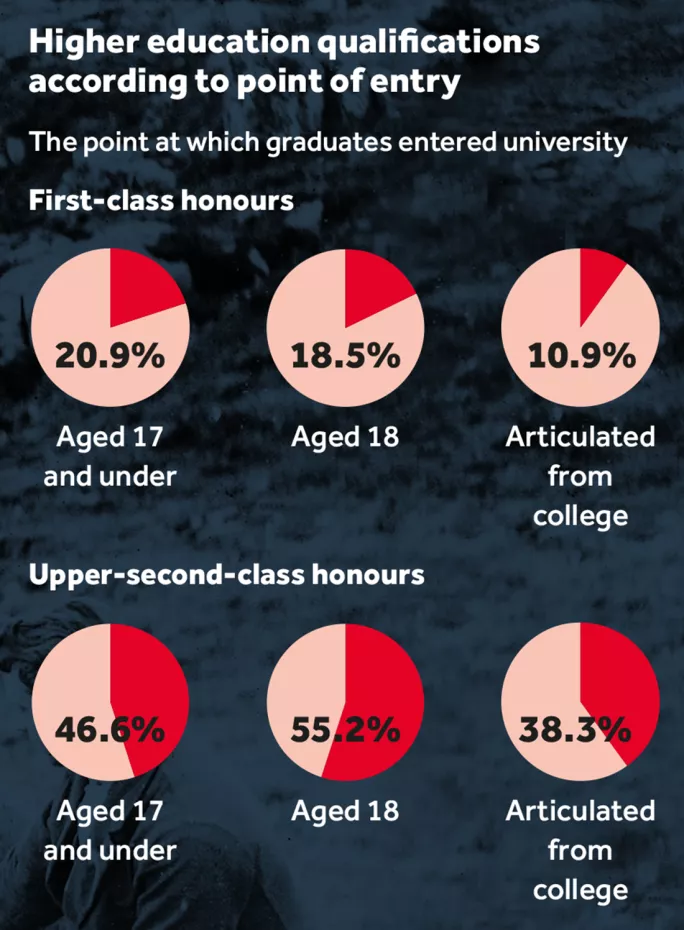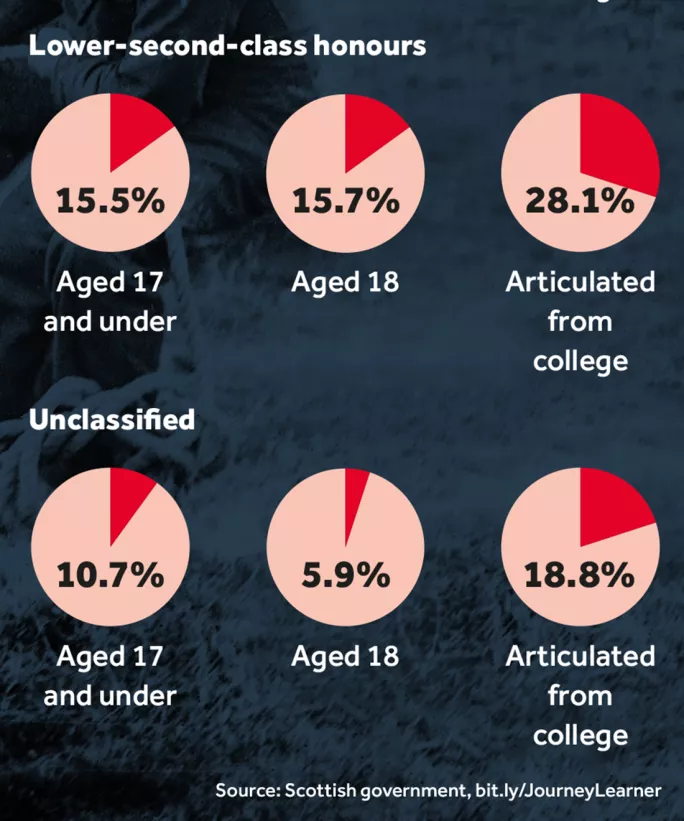
‘Fair access’ route to HE delivers fewer top degrees

Articulation is seen as key to unlocking opportunity for those whose educational routes might not have typically led them into higher education. The process, which allows students with a Higher National Diploma or Certificate to move straight into the second or third year of a university degree, is considered a way of opening up access to HE for those from disadvantaged backgrounds.
But a new government report, Learner Journey: analysis of Scottish education and training provision for 15- to 24-year-olds, published last week, shows that the proportion of those who articulate from college and go on to achieve a first-class or upper-second-class honours degree is significantly lower than for those entering university straight after the sixth year of school.
According to the report, 10.9 per cent of those who articulate graduate with first-class honours, “which is less than any other group”, including school leavers who go straight into the second or third year of university.
The “initial Scottish government draft analysis” also shows that articulating students are more likely than any other group to graduate as “unclassified”. Some 18.8 per cent of articulating students graduate as unclassified, compared with just 5.9 per cent of the group who enter university typically from S6. “Articulating students were also less likely to be awarded upper-second-class honours than any other group, yet more likely to be awarded lower-second-class honours,” the report finds.
NUS Scotland vice-president Jodie Waite says college students following this route may not currently be accessing the types of support that would improve their chances of success. “We know that articulating students are more likely to come from poorer backgrounds than those coming directly from school,” she says. “So, if we’re serious about fair access, we need to see a serious sector-wide effort to improve learner pathways between our colleges and universities.”
Waite adds: “We need to make sure that articulating students get the right support - not only as they prepare to move from college to university, but also once they’re at university, too. Whether it’s academic, financial or welfare support, we need to make sure they get the backing they need to succeed.
“While there are examples of good work being undertaken - and the [newly established] National Articulation Forum will be crucial in building on this - making articulation work better needs to be a priority for every college and university in Scotland.”
‘Empowering learners’
Colleges Scotland chief executive Shona Struthers says it is in the sector’s interest to establish a simpler and more efficient education system predicated on improving the learner journey and experience. “The pathways connecting schools, colleges, universities and employers are improving, but much still needs to be done to help people successfully navigate the system,” she adds. Colleges Scotland is co-convening the National Articulation Forum with Universities Scotland, Struthers explains, and a key objective is to make it easier and quicker for students to move from college to university through improved parity of qualifications recognition, which would help to end unnecessary repetition. “Such an approach would save time for the learner and money for the taxpayer,” she says.
Struthers adds that many college students who go to university have already overcome significant barriers, and some may not have achieved qualifications at school level before applying themselves and seizing opportunities at college. “We believe that more consistently applied curriculum alignment and courses being co-designed between colleges and universities would lead to an increase in the number of college entrants achieving first and upper-second university degrees,” she says.
“This approach will help to empower the learner to develop not only the technical and professional skills that HN (Higher National) qualifications are renowned for, but also the higher-level academic and research skills more commonly associated with degree-level study, which would increase graduates’ skill sets and employability, as well as foster inclusive economic growth.”
A Universities Scotland spokesperson says universities want to get the most out of articulation as a route into higher education because it benefits the student as well as both colleges and universities. They add: “That’s why we’ve created the National Articulation Forum, co-owned by colleges and universities, which will meet for the first time soon, where we will come together with students to remove any further barriers and identify solutions for increasing and enhancing articulation options across Scotland.”
The Learner Journey report also reveals that, in 2013-14, articulating students were more likely to be male than female, with a gender split of 53 per cent versus 47 per cent respectively. “The reverse is true when considering the gender balance in universities for undergraduate entry in 2013-14, where we find that a higher proportion of entrants are female than male,” it says.
“[The Scottish Funding Council] note that the gender split for articulation activity is considered to be positive in terms of tackling gender imbalance in degree study.”
A Scottish government spokesman says its aim is for “every young person to have an equal chance of going into higher education, and we recognise the important role that articulation plays in access to university”.
He adds: “If we are to be effective in delivering our ambition for fair access, it is vital that we deliver the support that all students need to succeed. Through the Outcome Agreement process [colleges and universities agreed delivery plans, in return for their funding] for 2018-19, universities are not only expected to set more ambitious and challenging targets for access, but to also agree improvements in retention, attainment and outcomes.”


You need a Tes subscription to read this article
Subscribe now to read this article and get other subscriber-only content:
- Unlimited access to all Tes magazine content
- Exclusive subscriber-only stories
- Award-winning email newsletters
- Unlimited access to all Tes magazine content
- Exclusive subscriber-only stories
- Award-winning email newsletters
You need a subscription to read this article
Subscribe now to read this article and get other subscriber-only content, including:
- Unlimited access to all Tes magazine content
- Exclusive subscriber-only stories
- Award-winning email newsletters
- Unlimited access to all Tes magazine content
- Exclusive subscriber-only stories
- Award-winning email newsletters